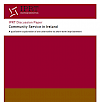Alternatives to Custody
IPRT advocates for an Irish penal policy that is focused on non-custodial responses to crime, and which has rehabilitation and social integration at its centre.
Ireland systematically overuses imprisonment as punishment. While the average prison population on any given day in Ireland is close to the European average, the rates of committal to prison on sentence – the ‘flow’ of prisoners through the system – means that Ireland is one of the most punitive criminal justice systems in Europe. Additionally, the majority of people are sent to prison for short-term sentences, often for less than 6 months. Irish prisons are chronically overcrowded, and many prisoners who are sent to prison could be more effectively dealt with using non-custodial means.
IPRT believes that the best way of limiting the use of imprisonment in Ireland is the development of an integrated system of alternatives to custody. Alternatives to custody could include the wider use of suspended sentences, community service orders, etc.
The Criminal Justice (Community Service) (Amendment) Act 2011 introduced a requirement that the courts consider imposing CSOs for offences that would ordinarily attract a sentence of 12 months’ imprisonment or less. However, the Annual Reports of the Irish Prison Service and the Probation Service since the enactment of the Amendment indicate that the legislation has so far not had the desired impact on reducing the use of imprisonment for less serious offences.
IPRT will continue to promote an increase in the use of non-custodial effective responses to crime as a means of reducing the numbers in detention, without net-widening.
Irish Penal Reform Trust welcomes increase in use of community service as a response to offending
17th June 2019
RELEASE: Although the rise in the number of offenders being dealt with through the Probation Service is welcome, IPRT is concerned at the fall in numbers participating in the Community Return Programme.
UK: Increased temporary release of prisoners leads to reduced reoffending
31st May 2019
Results from a study published by the Ministry of Justice suggest that increased use of release on temporary license before release from prison is associated with reduced offending on release.
Scotland: Extension of the presumption against short custodial sentences
17th May 2019
The Scottish Government has today officially announced plans to extend the current presumption against short custodial sentences.

UK: A study of the impact of a presumption against custodial sentences of three months or less in Scotland
8th May 2019
Crest evaluates the impact of the introduction of a presumption against the use of custodial sentences of three months or less in Scotland in 2011.
Doubling up in cells is an ineffective and short-term response to overcrowding
3rd May 2019
IPRT repsonse to reports of recategorisation of single cells to deal with overcrowding.

The Irish Times: ‘Prisoner numbers in highly successful rehabilitation scheme cut by half’
29th April 2019
The Irish Times reported on the drop in numbers being admitted to the Community Return Programme, with comment from IPRT’s Fíona Ní Chinnéide.
Chronic issues in Ireland's female prisons demand urgent government action on community-based alternatives - IPRT
13th March 2019
ADVISORY: IPRT responds to the publication of the Visiting Committee Annual Reports 2017 for the Dóchas Centre and Limerick Prison, calling on the Government to deliver on previous policy commitments to improve responses to women in prison.

The Irish Times: Sharp increase in Irish prison population
6th August 2018
The Irish Times has published an article and an editorial detailing the sharp increase in Ireland’s prison population in 2018, following years of decline and stability.
IPRT Submission to the Probation Service's Strategic Plan 2018-2020
16th February 2018
IPRT welcomes the opportunity to provide its views on the role and priorities of the Probation Service as part of the development of its Strategic Plan 2018-2020.

Community Service in Ireland: A qualitative exploration of one alternative to short-term imprisonment
11th October 2017
This discussion paper is based on the qualitative findings of employment-based PhD research completed by Dr Kate O'Hara.




